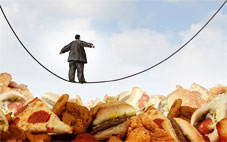
A License to Eat
Overeating and eating for the sake of appetite gratification distances a person from Divine light. The more a person is physical, the more his spirituality is weakened...

Translated by Rabbi Lazer Brody
Many of our holy men said that fasting is much easier than eating in holiness. A person can delight in praying from morning until night while getting a vacation from worrying about what to eat and what to drink.
Man was created to be a vegetarian. At the time of creation, Hashem gave man every type of fruit, nut, seed, grass, herb, vegetable and any other vegetative derivative. He did not give man milk, meat, poultry, fish, eggs or any other animal derivative at this point. Hashem gives permission to partake of meat and animal derivatives only later, in the Torah portion of Noah.
Why was man limited to be a vegetarian at first?
Before man began to be so morally corrupted, Adam and Eve were satisfied eating fruits, vegetables and  herbs. They were not allowed to kill animals or any other of Hashem's living creations. Their sole advantage over the other creations was their being created in the Divine image. They were not given the powers of reason, intuitiveness and free choice in order to hunt down the other creations and kill them. Man was not created to be a wild animal or predator. Worth noting also is that at the time of creation, the animals themselves were not predators and carnivores. They too ate plants, grains, berries and the like. The Torah says that Hashem designated specifically to them, "every green herb…for food". But only after Noah's generation – the generation of the flood – began misusing animals, Noah was allowed to slaughter the animals and eat their flesh.
herbs. They were not allowed to kill animals or any other of Hashem's living creations. Their sole advantage over the other creations was their being created in the Divine image. They were not given the powers of reason, intuitiveness and free choice in order to hunt down the other creations and kill them. Man was not created to be a wild animal or predator. Worth noting also is that at the time of creation, the animals themselves were not predators and carnivores. They too ate plants, grains, berries and the like. The Torah says that Hashem designated specifically to them, "every green herb…for food". But only after Noah's generation – the generation of the flood – began misusing animals, Noah was allowed to slaughter the animals and eat their flesh.
Rebbe Natan of Breslev explains that from creation until Noah's era, slaughter of animals was forbidden, for as long as the creations maintained their holiness, they didn't need a soul correction. But as the creations followed man's lead and became corrupted, they lost their holiness and were therefore in need of the soul correction of becoming a source of food for man.
King Solomon explains (see Ecclesiastes 7:29) that Hashem created man in a simple and straightforward manner, but by transgressing, man sorely complicated things. In doing so, man made his own soul correction much more difficult. He must work hard to attain emuna and humility, and to live in peace with his fellow man.
According to the information I received from competent medical professionals, the human digestive system is quite similar to the digestive system of the herbivorous animals. In truth, eating meat – especially processed meats – is not healthy. From a spiritual standpoint, it is not uplifting, either. One would be best advised to limit his or her consumption of meat and poultry to Sabbath, holidays and special occasions.
Our sages say that a person should not eat meat unless he is capable of "uplifting" the meat (see tractate Pesachim, 49b), in other words, bringing about a soul correction for the animal, bird, or fish by using its nutrients to provide strength for studying Torah and performing Hashem's commandments. But, eating meat for the sake of appetite and mere enjoyment makes a person less-refined. Consequently, unless an individual reflects the Divine image, he shouldn't eat meat.
Eating is not the prime interest of an individual who reflects the Divine image. The Torah tells us that when Moses ascended Mount Sinai and learned Torah from Hashem, he neither ate nor drank for forty days and nights. True, Moses's spiritual level has never been attained by anyone else, but he serves as a role model for the tzaddikim of subsequent generations. Elija the Prophet lived on bread and water that the crows would bring him. Hezekiah, despite his riches and his status as King of Israel, ate simple greens only. Rebbe Shimon bar Yochai lived for thirteen years on water and carobs, and Rebbe Chanina ben Dosa ate only carobs on weekdays. These tzaddikim fulfilled King Solomon's proverb that says, "A Righteous Person Eats to Satisfy His Soul" (Proverbs 13:25). In other words, his eating is for the purpose of vitality and maintaining the body's connection with the soul, in other words, to stay alive and healthy and not for the purpose of indulging, pleasure-seeking and appetite satisfaction. Lust and physical gratification play no part in a tzaddik's life. Everything he does is for the purpose of serving Hashem.
Overeating and eating for the sake of appetite gratification distances a person from Divine light. The more a person's orientation is physical, the more his spirituality is weakened. And, it's well known that overeating causes both spiritual and physical fatigue.
Every person must strive to attain the level where he eats to live instead of lives to eat. A person's efforts to reduce food intake also help him to deal with other bodily drives and appetites, since the lust for food is the most basic and ingrained of lusts that affects people of all ages. Rebbe Nachman says that since all bodily cravings stem from the lust for food and drink, when a person harnesses this lust, he is taking a major step in uprooting all other lusts (see Likutei Moharan I:62). Furthermore, when he channels his lust into the yearning and love for Hashem, he is capable of reaching lofty spiritual heights. The less he clings to his bodily desires, the more he is capable of clinging to Hashem.
We ask Hashem to sustain us, as King David writes in Psalm 145, "You open Your hand, and satisfy the desire of every living thing." The soul is satiated when our desire is to cling to Hashem. When a person's appetites and aspirations are materially-oriented, he is never satiated.
A person must realize that true satisfaction comes from Hashem, and no one or nothing else. Hashem can fill our lives with love, joy and gratification. No meal at the finest restaurant can do more than grant us a few moments of pleasure. Stop and think what happens to the fancy French cuisine after a person eats; despite the fact that a person may have paid hundreds of dollars for one gourmet meal, the food still breaks down in his body and most of it becomes waste. Such is the same outcome of all lust. When a person ponders the aftermath of lust before he indulges, he'll have the willpower to overcome or at least avoid the lust.
Stop looking for cheap thrills! Lasting satisfaction and happiness come from one source – the source of all good. The wisdom of holiness is that only Hashem can fill our hearts with joy and purpose, through our emuna and degree of clinging to Him. Easy, instant and cheap substitutes don't work. We'd therefore be best advised to minimize our material endeavors and invest more in spiritual growth and development. Pizza and Cola can't compare with the taste of emuna, ever!











Tell us what you think!
Thank you for your comment!
It will be published after approval by the Editor.